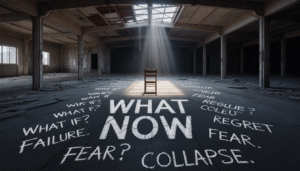
Popular
7 Powerful Ways to Stay Mentally Strong in a Crisis and Avoid a Breakdown
Master your mindset, control your fear, and stay resilient when chaos strikes.

A crisis situation—whether it’s a natural disaster, a sudden financial collapse, a personal emergency, or even a global catastrophe—can push the human mind to its limits. When chaos unfolds, stress and fear can easily take over, leading to poor decisions, paralysis, or even a total mental breakdown. The key to survival is not just having physical resources but mastering your mental resilience. Your mind is your greatest tool, and if you can keep it sharp, focused, and calm under pressure, you can navigate even the worst situations.
Here are seven powerful strategies to keep your mind from breaking down when facing a crisis:
1. Control Your Breathing
When panic sets in, your body’s natural response is to breathe faster and shallower, flooding your system with stress hormones like cortisol and adrenaline. This can lead to dizziness, disorientation, and even full-blown panic attacks. To counter this, you must take control of your breathing.
One of the best techniques is box breathing, a method used by Navy SEALs to stay calm under extreme pressure:
- Inhale deeply through your nose for four seconds.
- Hold your breath for four seconds.
- Exhale slowly through your mouth for four seconds.
- Hold again for four seconds before repeating.
This controlled breathing technique tricks your nervous system into a state of calm, helping you regain focus and clarity. Practicing this daily—even outside of crisis situations—can make it second nature when you need it most.
2. Assess the Situation Objectively
In a crisis, emotions can cloud your judgment. Fear, anger, or sadness can make problems seem bigger than they actually are, leading to panic-driven decisions. The best way to maintain control is to force yourself into an objective mindset—think like an outsider looking at the situation logically.
Ask yourself these three questions:
- What is the immediate threat? Identify the real danger, not just what your mind is exaggerating.
- What resources do I have? This includes physical supplies (food, water, shelter) and skills (first aid, navigation, self-defense).
- What is the next logical step? Instead of getting overwhelmed by the entire problem, focus on one action at a time.
The key here is breaking the problem into manageable pieces. A chaotic mind leads to paralysis, but a structured approach leads to action.
3. Focus on What You Can Control
One of the biggest causes of mental breakdowns is worrying about things outside your control. You cannot change the weather, other people’s actions, or past mistakes. What you can control is your response to the situation.
Imagine you’re stranded after a disaster. Wasting time worrying about when help will arrive won’t serve you. But focusing on your immediate needs—finding shelter, securing water, staying warm—will.
A simple mindset shift can prevent a spiral into panic:
- When fear creeps in, redirect your thoughts to what you can do right now.
- Set small, achievable tasks for yourself to maintain a sense of progress.
- Repeat a mantra like “I control my actions, not the chaos around me.”
By shifting your focus to the controllable, you prevent helplessness from creeping in.
4. Use the 5-4-3-2-1 Grounding Technique
When anxiety peaks, your brain can detach from reality, making it difficult to think clearly. Grounding techniques help bring you back to the present moment, reducing panic and improving mental clarity.
One of the best ways to do this is through the 5-4-3-2-1 method:
- 5 things you can see – Look around and name five visible objects (a tree, a backpack, a crack in the wall).
- 4 things you can touch – Feel four textures (your clothes, the ground, your skin, an object nearby).
- 3 things you can hear – Listen for three distinct sounds (birds, wind, distant traffic).
- 2 things you can smell – Identify two scents (earth, food, smoke).
- 1 thing you can taste – Focus on your saliva, a sip of water, or any lingering taste.
This technique forces your brain to focus on the present instead of spiraling into worst-case scenarios. Practicing it in moments of calm makes it easier to use under stress.
5. Adopt a Warrior Mindset
Survivors don’t think of themselves as victims; they adopt the mindset of a warrior. When faced with adversity, a warrior does not crumble—they adapt, endure, and overcome.
This means:
- Reframing obstacles as challenges you are meant to conquer.
- Speaking to yourself with strength, not defeat. Instead of “I can’t handle this,” say “I’ve survived worse, and I will survive this too.”
- Using past hardships as proof that you can make it through tough times again.
Developing mental toughness before a crisis happens—through physical training, stress exposure, and discipline—helps you face real challenges with grit and determination.
6. Stick to a Simple Routine
When everything around you is in disarray, creating a small sense of normalcy can keep your mind from spiraling. Even in extreme situations, humans crave structure—it gives us a sense of stability and control.
Some simple routines to maintain in a crisis:
- Eating at consistent times, even if meals are small.
- Stretching or exercising to relieve tension.
- Journaling or mentally reviewing what went well each day.
- Keeping your environment organized (a tidy space helps a tidy mind).
It doesn’t have to be elaborate. Even a small sense of control over daily actions can prevent mental breakdowns.
7. Lean on Your Tribe (or Build One Fast)
Humans are not meant to survive alone. When facing extreme stress, having even one other person to rely on can make a massive difference in mental stability.
If you’re in a crisis with others:
- Communicate openly and work together instead of panicking separately.
- Divide tasks to lighten the load and create efficiency.
- Reassure and support each other—morale is just as important as physical survival.
If you’re alone:
- Seek out others who share your survival mindset.
- Identify trustworthy allies and build mutual support.
Isolation breeds despair, but teamwork and social bonds keep morale high and problem-solving sharp.
Final Thoughts
Mental breakdowns happen when we let fear override logic. The key to surviving a crisis is mastering your mind first—your body and skills will follow.
By practicing calm breathing, objective thinking, controlled focus, grounding techniques, a warrior mindset, simple routines, and social support, you can stay clear-headed and strong, no matter the crisis.
The world is unpredictable, but your resilience can be trained. What strategies do you use to stay mentally tough in stressful situations? Share your thoughts in the comments below!
Follow on Spotify
LEARN MORE ON YOUTUBE!
ADVERTISEMENT
ADVERTISEMENT
ADVERTISEMENT
ADVERTISEMENT
RELATED POST
Address List
-
123, Any Street North
Your City Name
Country Name. P.O 3554 - +1 234 567 8902
- Urban Warrior Survival
Social Networks
- B.Roc Survival Podcast
- Discord
- Patreon
- Youtube
Links List
B.Roc Survival Inc.
All rights reserved









